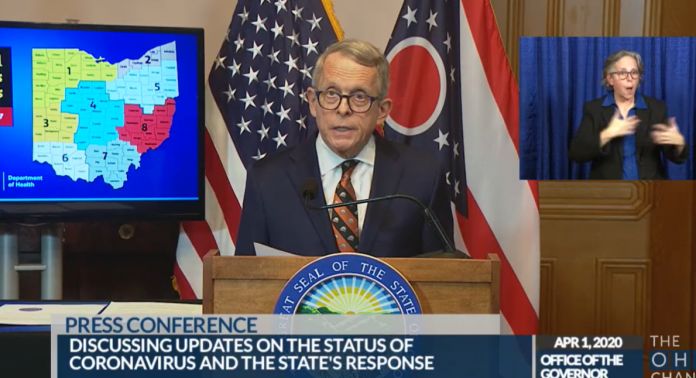Ohio Capital Journal
State leaders have already slashed half a billion dollars from the state budget, so billions in additional federal funding for Medicaid might sound good right now to those tasked with balancing Ohio’s books.
But Ohio Gov. Mike DeWine wouldn’t answer directly Monday when asked whether he supported a request by the National Governors Association that the feds boost funding for the health care program for the poor to levels similar to those during the Great Recession.
The Republican governor’s failure to endorse the request might underscore his complicated history with the Affordable Care Act and the expansion of the state Medicaid program it allowed. DeWine’s Republican predecessor, John Kasich, opted into the expansion in 2014, allowing about 700,000 additional Ohioans to receive government-funded health care.
With the massive job losses caused by COVID-19, the number of Ohioans qualifying for Medicaid is expected to increase sharply. And with the disease disproportionately affecting the poor and minorities, the system is likely to be burdened with bills for lengthy hospital stays that coronavirus often causes.
In its April 21 letter to congressional leaders, the Governors association noted the social-distancing measures they’d implemented, saying, “national and local economies are in dire straits and have resulted in the most dramatic contraction of the U.S. economy since World War II. Many states are already reporting precipitous declines in revenues that fund state services in health care, education, public safety, transportation, and other vital programs.”
In late March Congress increased the share of Ohio Medicaid paid by the feds by 6.2 percentage points, to 69.83%. Now the governors are asking that it be bumped up 6 points further, to 75.83%, and kept there until unemployment drops back below 5%.
Medicaid experts say the way the program is funded is complex, so it’s difficult to predict how much the increase would be worth to Ohio. But one said last week that the value would be in the billions.
On Monday, DeWine focused on how he could spend any additional federal money instead of the proposed Medicaid increase.
“Congress has spent a lot of money, unprecedented in the history of this country,” he said when asked about the request by the Governors association. “There was a need for that. But the most important thing for us, and I want to stay focused on my message, is we need flexibility in how we spend that money.”
Pressed on the matter, he said, “I’ll look at the proposal. I have not looked at that specific proposal. I’m saying my message to our representatives… and I’ve talked to them a lot about this… is give us some flexibility so we can move this money around so we can cover some holes.”
DeWine’s position on the Medicaid program has evolved, for years opposing the Affordable Care Act and the Medicaid expansion it allows. Then in 2018, while he was running for governor, DeWine changed his stance and said he would not act to get rid of the expansion.
DeWine’s fellow Republican, Ohio U.S. Sen. Rob Portman, voted as recently as 2017 to repeal the entire Affordable Care Act, also known as Obamacare. Last week Emmalee Kalmbach, his spokeswoman, used language similar to DeWine’s when asked if Portman supported further increasing the share of Medicaid paid by the federal government.
“This is consistent with how President Obama and a Democrat-controlled Congress acted during the Great Recession in 2009,” Kalmbach said in an email. “Our focus is on providing states with the resources and funding flexibility they (need) to help address their budget shortfalls, including Medicaid, that are happening because of this pandemic.”
Meanwhile, Ohio U.S. Sen. Sherrod Brown, a Democrat, supports increased Medicaid funding beyond what the governors requested.
“Sen. Brown has always fought to ensure that Americans have access to quality healthcare, which is even more important during the pandemic,” a spokesman said in an email. “As states like Ohio see major increases in individuals and families eligible and in need of Medicaid assistance, Sen. Brown is pushing for additional Medicaid Federal Medical Assistance Percentage (FMAP) support for all Medicaid populations to help address this influx.”
The spokesman added that Brown also wants to create incentives to expand Medicaid in the 14 states that haven’t already done so.
***
Also from Ohio Capital Journal:
Despite staggering case counts and 50 deaths, prisons halt mass COVID-19 testing
Two prisons in Ohio have become two of the worst COVID-19 hot spots in the nation. The state, meanwhile, has halted the mass testing that detected the virus in more than 75% of the inmates in two Ohio prisons.
At Belmont Correctional Institution, which looks to be the newest prison crushed by the spread of the new coronavirus, a corrections officer described the protocol in an interview.
“Once we have more than five inmates come out of a dorm, they consider that whole dorm as positive,” said Scott Stevens, a corrections officer at Belmont of 24 years and the president of the local union representing civil servants.
“I believe all of our areas now have at least five positives.”
By the official count, however, there are only 92 confirmed cases among inmates and 42 among staff. READ MORE





